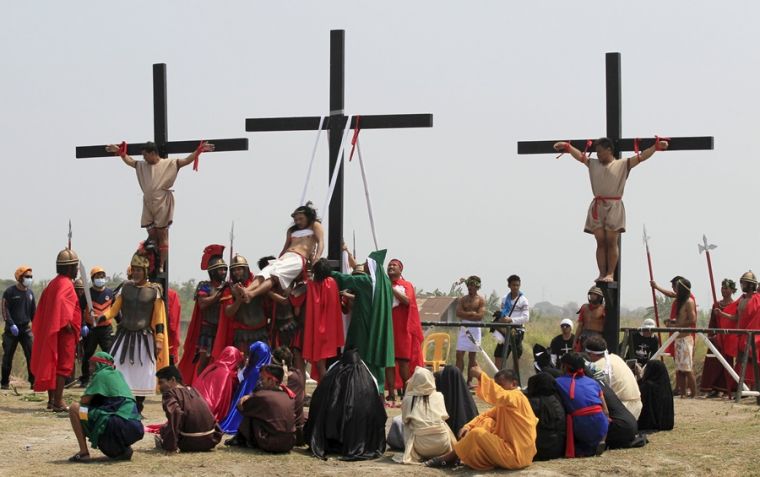Only in the Philippines: Good Friday crucifixions see Filipinos mixing Christianity with crass commercialism

Nowhere is the Passion of Christ most dramatically relived annually than in the Philippines—a Catholic country that combines Christianity and commercialism like no other country does.
On Good Friday, the Filipinos' unique brand of faith was again on full display as a number of bare-footed Christian devotees flagellated themselves on the road while others were nailed on the cross in a re-enactment of the crucifixion of Jesus Christ more than 2,000 years ago.
In the town of San Pedro in Laguna province some 90 minutes drive from the capital Manila, men had themselves nailed to crosses, reports said.
The devotees typically say they endure the excruciating pain to be closer to God and to gain His favour or to atone for past sins.
But what made the scene looked surreal was the sight of posters advertising the Philippines' biggest telecommunication companies, U.S. fast food chain McDonald's, energy drinks and a local motel chain. The posters were hung across the dry fields where the crucifixion re-enactments took place.
A 44-year-old resident of the town said she went to church first before setting up shop near the crucifixion site selling fried fish, snacks and souvenir shirts beneath a branded tent she rented from a major telco.
"We prayed to God to let us earn a little money; we prayed for people to buy all of our merchandise," she told Agence France Presse as quoted by Yahoo News.
As the Good Friday rituals went on, tourists, both foreign and local, were on hand to take pictures and marvel at the sight.
The crucifixion event even had major sponsors—two of the Philippines largest mobile phone companies. In exchange for free advertising and a nook to sell its merchandise, one of them live-streamed the event on the Internet and provided free Wi-Fi access on-site.
This enabled the tourists and other onlookers to instantly upload selfies taken with the crucified devotees for background.
A representative of a telecom company even boasted that their products "are selling like hotcakes" as a result of their sponsorship of the crucifixions.
The Philippine Catholic Church does not sanction these extreme forms of piety. Manila auxillary Archbishop Broderick Pabillo, said the Church discourages these senseless acts of self-inflicted violence, particularly when they are tainted with commercialism.
"To use that for commerce is not a manifestation of the faith," Pabillo told AFP.
"There is really a danger that we will not promote the reason for the season of Holy Week. The focus should be on Jesus, on His sacrifice, not on us, not the one who mimics the crucifixion," he added.
However, local authorities and organisers admit that they do not treat the crucifixions as a religious event, even though participants do it to underline their faith.
"It's a cultural activity, a part of the heritage of our people," one of the organisers said.











